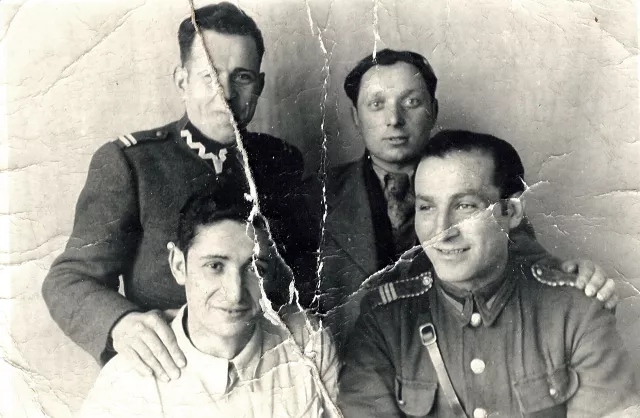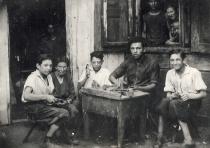On this photo you can see myself (first from left, in the bottom row) shortly after the end of World War II and my relase from the Russian army. The other people on the photo were my collegues from the army. I remember the names of the two people standing: Szol (first from left) and Abram Avrejnal (from right). I don?t remember the name of the fellow who's sitting.
When I was in the Russian army, they sent me to Chelyabinsk, to an aluminum factory. That was when I got separated from my brother, who got sent elsewhere. In Chelyabinsk I worked on a building site. And I said to the foreman: 'I'm a cobbler.' So he said: 'Go and get your tools, you can repair shoes.' But I didn't understand Russki, didn't understand that you had to get a permit to leave, so I got on a train to Kurgan and off I went. I don't remember where they caught me, it might have been Alma Ata or somewhere else, but they hauled me off the train and they were telling me I had escaped from the army. And after that they ferried me around, I can't remember where the court was, somewhere in Russia. I didn't understand anything, they were all speaking Russian. I got the death penalty, that's all I understood. But just afterwards they kept me in prison - I don't remember where or how long. Later they changed my sentence to ten years' labor - I'd learnt a bit of Russian, so I understood that.
When they'd changed my sentence they shipped me out to Nizhniy Tagil, to a camp, and turned me out into the middle of nowhere. Starved as a dog I was. Frozen hands. I even slept in my clothes, had nowhere to lay my head. After that they built barracks and we slept in our clothes there too, as they didn't heat them. One camp commandant came out from Moscow and gave an order that they were to hand out mattresses. Once I started working there, this naradchik came along and said: 'You're going to Moscow. You're going to work and from there you can get home.' He was a Jew, he was in the camps too, but he was a naradchik. And I went to Moscow. In Moscow I worked in a camp, as a cobbler.
This picture was taken in Lukow. When I got back there I started working straight off, they gave me somewhere to live, I had a place to lay my head. I remember that some people came round asking if I wanted to help take ours, the bodies of Jews, out of the Catholic cemetery. I went to the grave, opened it up, and we dug out three men and two women, and took them to our cemetery.
Mojsze Sznejser with his friends from army
The Centropa Collection at USHMM
The Centropa archive has been acquired by the United States Holocaust Memorial Museum in Washington, DC.
USHMM will soon offer a Special Collections page for Centropa.
Academics please note: USHMM can provide you with original language word-for-word transcripts and high resolution photographs. All publications should be credited: "From the Centropa Collection at the United States Memorial Museum in Washington, DC". Please contact collection [at] centropa.org.












